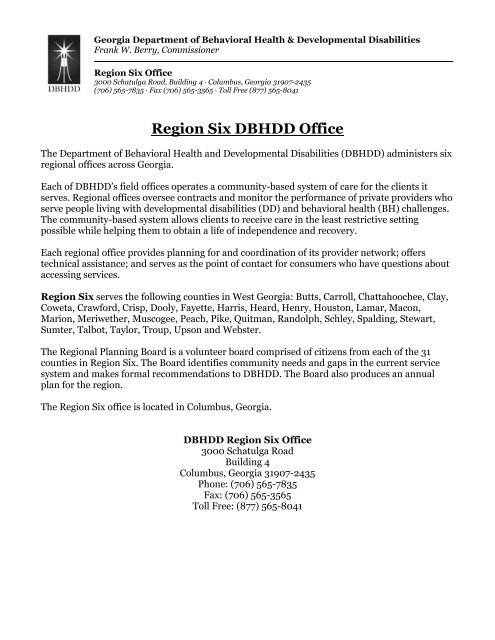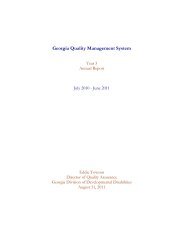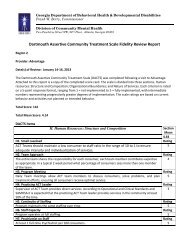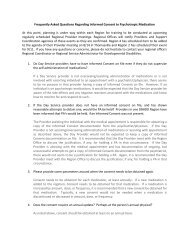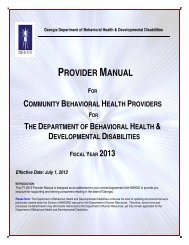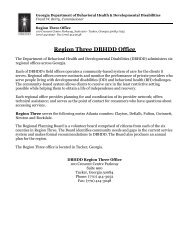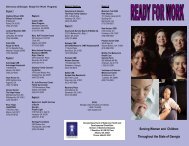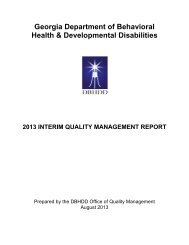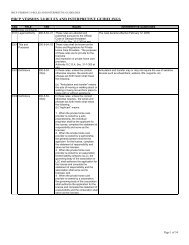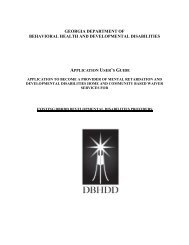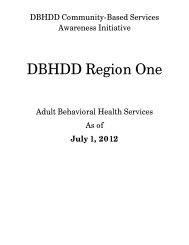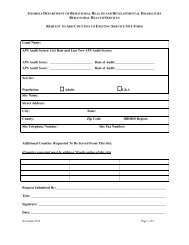Region Six Community-Based Services - Department of Behavioral ...
Region Six Community-Based Services - Department of Behavioral ...
Region Six Community-Based Services - Department of Behavioral ...
Create successful ePaper yourself
Turn your PDF publications into a flip-book with our unique Google optimized e-Paper software.
Georgia <strong>Department</strong> <strong>of</strong> <strong>Behavioral</strong> Health & Developmental Disabilities<br />
Frank W. Berry, Commissioner<br />
<strong>Region</strong> <strong>Six</strong> Office<br />
3000 Schatulga Road, Building 4 · Columbus, Georgia 31907-2435<br />
(706) 565-7835 · Fax (706) 565-3565 · Toll Free (877) 565-8041<br />
<strong>Region</strong> <strong>Six</strong> DBHDD Office<br />
The <strong>Department</strong> <strong>of</strong> <strong>Behavioral</strong> Health and Developmental Disabilities (DBHDD) administers six<br />
regional <strong>of</strong>fices across Georgia.<br />
Each <strong>of</strong> DBHDD’s field <strong>of</strong>fices operates a community-based system <strong>of</strong> care for the clients it<br />
serves. <strong>Region</strong>al <strong>of</strong>fices oversee contracts and monitor the performance <strong>of</strong> private providers who<br />
serve people living with developmental disabilities (DD) and behavioral health (BH) challenges.<br />
The community-based system allows clients to receive care in the least restrictive setting<br />
possible while helping them to obtain a life <strong>of</strong> independence and recovery.<br />
Each regional <strong>of</strong>fice provides planning for and coordination <strong>of</strong> its provider network; <strong>of</strong>fers<br />
technical assistance; and serves as the point <strong>of</strong> contact for consumers who have questions about<br />
accessing services.<br />
<strong>Region</strong> <strong>Six</strong> serves the following counties in West Georgia: Butts, Carroll, Chattahoochee, Clay,<br />
Coweta, Crawford, Crisp, Dooly, Fayette, Harris, Heard, Henry, Houston, Lamar, Macon,<br />
Marion, Meriwether, Muscogee, Peach, Pike, Quitman, Randolph, Schley, Spalding, Stewart,<br />
Sumter, Talbot, Taylor, Troup, Upson and Webster.<br />
The <strong>Region</strong>al Planning Board is a volunteer board comprised <strong>of</strong> citizens from each <strong>of</strong> the 31<br />
counties in <strong>Region</strong> <strong>Six</strong>. The Board identifies community needs and gaps in the current service<br />
system and makes formal recommendations to DBHDD. The Board also produces an annual<br />
plan for the region.<br />
The <strong>Region</strong> <strong>Six</strong> <strong>of</strong>fice is located in Columbus, Georgia.<br />
DBHDD <strong>Region</strong> <strong>Six</strong> Office<br />
3000 Schatulga Road<br />
Building 4<br />
Columbus, Georgia 31907-2435<br />
Phone: (706) 565-7835<br />
Fax: (706) 565-3565<br />
Toll Free: (877) 565-8041
Georgia <strong>Department</strong> <strong>of</strong> <strong>Behavioral</strong> Health & Developmental Disabilities<br />
Frank W. Berry, Commissioner<br />
<strong>Region</strong> <strong>Six</strong> Office<br />
3000 Schatulga Road, Building 4 · Columbus, Georgia 31907-2435<br />
(706) 565-7835 · Fax (706) 565-3565 · Toll Free (877) 565-8041<br />
<strong>Region</strong> <strong>Six</strong> DBHDD Office<br />
Contact Information<br />
<strong>Region</strong>al Coordinator<br />
Leland Johnson<br />
(706) 565-3478<br />
lhjohnson1@dbhdd.ga.gov<br />
<strong>Behavioral</strong> Health <strong>Region</strong>al <strong>Services</strong> Administrator<br />
Chris Newland (Acting)<br />
(706) 569-2974<br />
chnewlan@dbhdd.ga.gov<br />
Developmental Disabilities <strong>Region</strong>al <strong>Services</strong> Administrator<br />
Valona Baldwin (Acting)<br />
(706) 565-3692<br />
vjbaldwin@dbhdd.ga.gov
Dade<br />
1<br />
Walker<br />
Chattooga<br />
G<br />
Georgia <strong>Department</strong> <strong>of</strong> <strong>Behavioral</strong> Health and Developmental Disabilities<br />
State Psychiatric Hospitals, Private Hospitals (Contracted)<br />
and <strong>Community</strong> Service Areas<br />
Catoosa<br />
A<br />
Floyd<br />
Polk<br />
Haralson<br />
Whitfield<br />
Carroll<br />
Heard<br />
Troup<br />
Quitman<br />
Gordon<br />
2<br />
B<br />
Douglas<br />
5 F 6<br />
Paulding<br />
Gilmer<br />
REGION 1<br />
Pike<br />
REGION 6<br />
Muscogee<br />
Chattahoochee<br />
Clay<br />
Bartow<br />
15<br />
Harris<br />
2<br />
Randolph<br />
Seminole<br />
Murray<br />
Coweta<br />
17<br />
Stewart<br />
Early<br />
Meriwether<br />
Miller<br />
Cobb<br />
Pickens<br />
E<br />
C<br />
Gwinnett<br />
REGION<br />
D<br />
3<br />
De Kalb 9<br />
1 8<br />
7<br />
Fulton<br />
Clayton<br />
Fayette<br />
Webster<br />
Calhoun<br />
Cherokee<br />
4<br />
Talbot<br />
Marion<br />
20<br />
Decatur<br />
Terrell<br />
Baker<br />
Fannin<br />
Spalding<br />
Upson<br />
Schley<br />
Lumpkin<br />
Dawson<br />
Forsyth<br />
Henry<br />
16<br />
Taylor<br />
Lamar<br />
Sumter<br />
Dougherty<br />
Union<br />
Rockdale<br />
Butts<br />
Crawford<br />
Towns<br />
White<br />
Mitchell<br />
REGION 4<br />
Grady<br />
Lee<br />
21<br />
Habersham<br />
Stephens<br />
Banks<br />
Jackson<br />
Pulaski<br />
Franklin<br />
Bleckley<br />
Madison<br />
Barrow Clarke<br />
Oconee Oglethorpe<br />
Walton<br />
Wilkes<br />
10 Lincoln<br />
11<br />
Morgan<br />
Newton<br />
Greene Taliaferro<br />
Columbia<br />
McDuffie<br />
Monroe<br />
Crisp<br />
Jasper<br />
Bibb<br />
Peach<br />
Houston<br />
Macon<br />
18<br />
Thomas<br />
5<br />
3<br />
Hall<br />
19<br />
Dooly<br />
Worth<br />
Colquitt<br />
Jones<br />
12<br />
Turner<br />
Brooks<br />
Rabun<br />
Twiggs<br />
Wilcox<br />
Tift<br />
Cook<br />
Putnam<br />
3<br />
Baldwin<br />
Irwin<br />
22<br />
Wilkinson<br />
Dodge<br />
Ben Hill<br />
Berrien<br />
Lowndes<br />
Warren<br />
REGION 2<br />
13<br />
Hancock<br />
Lanier<br />
Hart<br />
Elbert<br />
Washington<br />
Laurens<br />
23<br />
Telfair<br />
Wheeler<br />
C<strong>of</strong>fee<br />
Atkinson<br />
Echols<br />
Glascock<br />
Johnson<br />
Treutlen<br />
Montgomery<br />
Jeff Davis<br />
Clinch<br />
Jefferson<br />
Richmond<br />
Candler<br />
Evans<br />
Appling<br />
REGION 5<br />
Bacon<br />
25<br />
Ware<br />
State Psychiatric Hospitals (numbers in dark circles)<br />
1 Georgial <strong>Region</strong>al Hospital at Atlanta- Atlanta<br />
2 West Central Georgia <strong>Region</strong>al Hospital - Columbus<br />
3 Central State Hospital (Forensics) - Milledgeville<br />
4 East Central <strong>Region</strong>al Hospital - Augusta<br />
5 Southwestern State Hospital - Thomasville<br />
6 - Georgia <strong>Region</strong>al Hospital at Savannah - Savannah<br />
Private Psychiatric Hospitals (letters in white circles)<br />
A Floyd Medical Center - Rome<br />
B Wellstar Cobb Hospital - Austell<br />
C Laurelwood - Gainesville<br />
D Peachford Hospital - Dunwoody<br />
E Summitridge - Lawrenceville<br />
F - Anchor Hospital - Atlanta<br />
G - Willowbrook at Tanner - Carrollton<br />
*NOTE: These hospitlas have been contracted by DBHDD<br />
to receive individulas from counties in <strong>Region</strong> 1.<br />
Emanuel<br />
Toombs<br />
14<br />
Pierce<br />
4<br />
24<br />
Jenkins<br />
Tattnall<br />
Charlton<br />
Burke<br />
Brantley<br />
Wayne<br />
Bulloch<br />
Long<br />
Screven<br />
Camden<br />
Bryan<br />
Liberty<br />
Glynn<br />
Effingham<br />
26<br />
McIntosh<br />
Chatham<br />
6<br />
<strong>Community</strong> Service Areas:<br />
1 Lookout Mountain <strong>Community</strong> <strong>Services</strong> 10 Advantage <strong>Behavioral</strong> Health Systems<br />
19 Phoenix Center <strong>Behavioral</strong> Health <strong>Services</strong><br />
2 Highland Rivers <strong>Community</strong> Service Board 11 CSB <strong>of</strong> East Central Georgia (Serenity <strong>Behavioral</strong> Health) 20 Albany Area <strong>Community</strong> Service Board<br />
3 Avita <strong>Community</strong> Partners 12 River Edge <strong>Behavioral</strong> Health Center<br />
21 Georgia Pines <strong>Community</strong> MHMRSA <strong>Services</strong><br />
4 Cobb <strong>Community</strong> Service Board 13 Oconee <strong>Community</strong> Service Board<br />
22 <strong>Behavioral</strong> Health <strong>Services</strong> <strong>of</strong> South Georgia<br />
5 Douglas <strong>Community</strong> Service Board 14 Ogeechee <strong>Behavioral</strong> Health <strong>Services</strong><br />
23 <strong>Community</strong> Service Board <strong>of</strong> Middle Georgia<br />
6 Fulton County MHDDAD 15 Pathways Center for <strong>Behavioral</strong> & Developmental Growth 24 Pineland Area <strong>Community</strong> Service Board<br />
7 Clayton <strong>Community</strong> Service Board 16 McIntosh Trail <strong>Community</strong> Service Board 25 Unison <strong>Behavioral</strong> Health (formerly Satilla CSB)<br />
8 DeKalb <strong>Community</strong> Service Board 17 New Horizons <strong>Community</strong> Service Board 26 - Gateway <strong>Community</strong> Service Board<br />
9 - View Point Health (formerly GRN CSB) 18 - Middle Flint <strong>Behavioral</strong> Healthcare *NOTE: Numbered Service Areas are for identification purposes only.<br />
DBHDD, Office <strong>of</strong> Decison Support & Information Management (Created: 07/29/2013).
Dade<br />
1<br />
Walker<br />
Chattooga<br />
G<br />
Georgia <strong>Department</strong> <strong>of</strong> <strong>Behavioral</strong> Health and Developmental Disabilities<br />
State Psychiatric Hospitals, Private Hospitals (Contracted)<br />
and <strong>Community</strong> Service Areas<br />
Catoosa<br />
A<br />
Floyd<br />
Polk<br />
Haralson<br />
Whitfield<br />
Carroll<br />
Heard<br />
Troup<br />
Quitman<br />
Gordon<br />
2<br />
B<br />
Douglas<br />
5 F 6<br />
Paulding<br />
Gilmer<br />
REGION 1<br />
Pike<br />
REGION 6<br />
Muscogee<br />
Chattahoochee<br />
Clay<br />
Bartow<br />
15<br />
Harris<br />
2<br />
Randolph<br />
Seminole<br />
Murray<br />
Coweta<br />
17<br />
Stewart<br />
Early<br />
Meriwether<br />
Miller<br />
Cobb<br />
Pickens<br />
E<br />
C<br />
Gwinnett<br />
REGION<br />
D<br />
3<br />
De Kalb 9<br />
1 8<br />
7<br />
Fulton<br />
Clayton<br />
Fayette<br />
Webster<br />
Calhoun<br />
Cherokee<br />
4<br />
Talbot<br />
Marion<br />
20<br />
Decatur<br />
Terrell<br />
Baker<br />
Fannin<br />
Spalding<br />
Upson<br />
Schley<br />
Lumpkin<br />
Dawson<br />
Forsyth<br />
Henry<br />
16<br />
Taylor<br />
Lamar<br />
Sumter<br />
Dougherty<br />
Union<br />
Rockdale<br />
Butts<br />
Crawford<br />
Towns<br />
White<br />
Mitchell<br />
REGION 4<br />
Grady<br />
Lee<br />
21<br />
Habersham<br />
Stephens<br />
Banks<br />
Jackson<br />
Pulaski<br />
Franklin<br />
Bleckley<br />
Madison<br />
Barrow Clarke<br />
Oconee Oglethorpe<br />
Walton<br />
Wilkes<br />
10 Lincoln<br />
11<br />
Morgan<br />
Newton<br />
Greene Taliaferro<br />
Columbia<br />
McDuffie<br />
Monroe<br />
Crisp<br />
Jasper<br />
Bibb<br />
Peach<br />
Houston<br />
Macon<br />
18<br />
Thomas<br />
5<br />
3<br />
Hall<br />
19<br />
Dooly<br />
Worth<br />
Colquitt<br />
Jones<br />
12<br />
Turner<br />
Brooks<br />
Rabun<br />
Twiggs<br />
Wilcox<br />
Tift<br />
Cook<br />
Putnam<br />
3<br />
Baldwin<br />
Irwin<br />
22<br />
Wilkinson<br />
Dodge<br />
Ben Hill<br />
Berrien<br />
Lowndes<br />
Warren<br />
REGION 2<br />
13<br />
Hancock<br />
Lanier<br />
Hart<br />
Elbert<br />
Washington<br />
Laurens<br />
23<br />
Telfair<br />
Wheeler<br />
C<strong>of</strong>fee<br />
Atkinson<br />
Echols<br />
Glascock<br />
Johnson<br />
Treutlen<br />
Montgomery<br />
Jeff Davis<br />
Clinch<br />
Jefferson<br />
Richmond<br />
Candler<br />
Evans<br />
Appling<br />
REGION 5<br />
Bacon<br />
25<br />
Ware<br />
State Psychiatric Hospitals (numbers in dark circles)<br />
1 Georgial <strong>Region</strong>al Hospital at Atlanta- Atlanta<br />
2 West Central Georgia <strong>Region</strong>al Hospital - Columbus<br />
3 Central State Hospital (Forensics) - Milledgeville<br />
4 East Central <strong>Region</strong>al Hospital - Augusta<br />
5 Southwestern State Hospital - Thomasville<br />
6 - Georgia <strong>Region</strong>al Hospital at Savannah - Savannah<br />
Private Psychiatric Hospitals (letters in white circles)<br />
A Floyd Medical Center - Rome<br />
B Wellstar Cobb Hospital - Austell<br />
C Laurelwood - Gainesville<br />
D Peachford Hospital - Dunwoody<br />
E Summitridge - Lawrenceville<br />
F - Anchor Hospital - Atlanta<br />
G - Willowbrook at Tanner - Carrollton<br />
*NOTE: These hospitlas have been contracted by DBHDD<br />
to receive individulas from counties in <strong>Region</strong> 1.<br />
Emanuel<br />
Toombs<br />
14<br />
Pierce<br />
4<br />
24<br />
Jenkins<br />
Tattnall<br />
Charlton<br />
Burke<br />
Brantley<br />
Wayne<br />
Bulloch<br />
Long<br />
Screven<br />
Camden<br />
Bryan<br />
Liberty<br />
Glynn<br />
Effingham<br />
26<br />
McIntosh<br />
Chatham<br />
6<br />
<strong>Community</strong> Service Areas:<br />
1 Lookout Mountain <strong>Community</strong> <strong>Services</strong> 10 Advantage <strong>Behavioral</strong> Health Systems<br />
19 Phoenix Center <strong>Behavioral</strong> Health <strong>Services</strong><br />
2 Highland Rivers <strong>Community</strong> Service Board 11 CSB <strong>of</strong> East Central Georgia (Serenity <strong>Behavioral</strong> Health) 20 Albany Area <strong>Community</strong> Service Board<br />
3 Avita <strong>Community</strong> Partners 12 River Edge <strong>Behavioral</strong> Health Center<br />
21 Georgia Pines <strong>Community</strong> MHMRSA <strong>Services</strong><br />
4 Cobb <strong>Community</strong> Service Board 13 Oconee <strong>Community</strong> Service Board<br />
22 <strong>Behavioral</strong> Health <strong>Services</strong> <strong>of</strong> South Georgia<br />
5 Douglas <strong>Community</strong> Service Board 14 Ogeechee <strong>Behavioral</strong> Health <strong>Services</strong><br />
23 <strong>Community</strong> Service Board <strong>of</strong> Middle Georgia<br />
6 Fulton County MHDDAD 15 Pathways Center for <strong>Behavioral</strong> & Developmental Growth 24 Pineland Area <strong>Community</strong> Service Board<br />
7 Clayton <strong>Community</strong> Service Board 16 McIntosh Trail <strong>Community</strong> Service Board 25 Unison <strong>Behavioral</strong> Health (formerly Satilla CSB)<br />
8 DeKalb <strong>Community</strong> Service Board 17 New Horizons <strong>Community</strong> Service Board 26 - Gateway <strong>Community</strong> Service Board<br />
9 - View Point Health (formerly GRN CSB) 18 - Middle Flint <strong>Behavioral</strong> Healthcare *NOTE: Numbered Service Areas are for identification purposes only.<br />
DBHDD, Office <strong>of</strong> Decison Support & Information Management (Created: 07/29/2013).
<strong>Region</strong> <strong>Six</strong> <strong>Community</strong> Service Providers<br />
Georgia Crisis & Access Line – (800) 715-4225<br />
Pathways Center for <strong>Behavioral</strong> Health Counties Served:<br />
and Developmental Growth<br />
Carroll, Coweta, Heard, Meriwether,<br />
120 Gordon Commercial Drive, Suite A Troup<br />
LaGrange, GA 30240<br />
Phone: (706) 845-4045<br />
Jade Benefield, Director<br />
Fax: (706) 845-4341<br />
jade.benefield@pathwayscsb.org<br />
McIntosh Trail <strong>Community</strong> Service Board Counties Served:<br />
1501-A Kalamazoo Drive Butts, Fayette, Henry, Lamar, Pike,<br />
Griffin, GA 30224<br />
Spalding, Upson<br />
Phone: (770) 358-8250<br />
Fax: (770) 229-3223<br />
Pat McCollum, Director<br />
pmccollum@mctrail.org<br />
***<br />
***<br />
New Horizons <strong>Community</strong> Service Board Counties Served:<br />
2100 Comer Avenue Chattahoochee, Clay, Harris, Muscogee,<br />
Columbus, GA 31907<br />
Quitman, Randolph, Stewart, Talbot<br />
Phone: (706) 596-5583<br />
Fax: (706) 596-5589<br />
Sherman Whitfield, CEO<br />
swhitfield@newhorizonscsb.com<br />
Middle Flint <strong>Behavioral</strong> Healthcare<br />
Counties Served:<br />
415 North Jackson Street Crisp, Dooly, Macon, Marion, Schley,<br />
Americus, GA 31709<br />
Sumter, Taylor, Webster<br />
Phone: (229) 931-2470<br />
Fax: (229) 931-2474<br />
Beth Regan, CEO<br />
bethr@sstarga.com<br />
***<br />
***<br />
Phoenix Center <strong>Behavioral</strong> Health <strong>Services</strong> Counties Served:<br />
940 Highway 96 Crawford, Houston, Peach<br />
Warner Robbins, GA 31088<br />
Phone: (478) 988-1002<br />
James Singleton, CEO<br />
Fax: (478) 988-1106<br />
jamessingleton@phoenixcenterbhs.com
<strong>Region</strong> <strong>Six</strong> <strong>Community</strong>-<strong>Based</strong> <strong>Services</strong><br />
BEHAVIORAL HEALTH<br />
Mental Health <strong>Services</strong><br />
Adult Core <strong>Services</strong> are basic outpatient services for people with a serious mental illness or<br />
an addictive disease. <strong>Services</strong> consist <strong>of</strong> evaluations by both a psychiatrist and a nurse; the<br />
development <strong>of</strong> a treatment plan, which may include prescription medication; a schedule <strong>of</strong><br />
appointments for outpatient counseling; supported employment; and home visits by a<br />
community service worker. In <strong>Region</strong> <strong>Six</strong>, these services are provided by five <strong>Community</strong><br />
<strong>Services</strong> Boards (CSBs) and one private provider. <strong>Behavioral</strong> Health Core <strong>Services</strong> include:<br />
<strong>Behavioral</strong> Health Assessment and Service Plan Development<br />
Psychological Testing<br />
Diagnostic Assessment<br />
Crisis Intervention<br />
Psychiatric Treatment<br />
Nursing Assessment and Care<br />
Medication Administration<br />
<strong>Community</strong> Support<br />
Individual Outpatient <strong>Services</strong><br />
Group Outpatient <strong>Services</strong><br />
Family Outpatient <strong>Services</strong><br />
Pharmaceutical Treatment<br />
Adult Crisis Stabilization <strong>Services</strong> provide treatment in Crisis Stabilization Units (CSUs).<br />
<strong>Services</strong> include rapid stabilization <strong>of</strong> the behaviors and symptoms exhibited by persons in an<br />
acute phase <strong>of</strong> mental illness and detoxification services to individuals high on drugs or alcohol.<br />
Adult Inpatient Hospitalization <strong>Services</strong> support individuals whose behaviors or<br />
symptoms are too acute to be effectively managed in a CSU. These services are provided through<br />
West Central Georgia <strong>Region</strong>al Hospital (WCGRH) and two private hospitals. Upon discharge<br />
from the hospitals, patients are referred to a core provider for outpatient care.<br />
Adult Residential <strong>Services</strong> range from intensive treatment in a small residential setting to<br />
providing rent supplements to help persons in recovery live as independently as possible. These<br />
services include group homes, supervised apartment programs and Shelter-Plus-Care programs.<br />
Approximately 375 residential beds serve an estimated 650 people per year.<br />
Assertive <strong>Community</strong> Treatment (ACT), also known as “a hospital without walls,”<br />
provides full service teams, with small caseloads, that <strong>of</strong>fer more intense services in the<br />
community. <strong>Region</strong> <strong>Six</strong> has three ACT Teams operated by two CSBs and one private provider.<br />
The teams are based in Columbus, LaGrange and Griffin, and operate within a 50 mile radius <strong>of</strong><br />
each town. Each team focuses on individuals with a serious mental illness who are most at risk<br />
for re-hospitalization, homelessness or incarceration. This service is specified in the DOJ<br />
Settlement Agreement.<br />
Case Management (CM) and <strong>Community</strong> Service Teams go to individuals in their<br />
homes, or other places in the community, to support recovery efforts. Caseloads are usually
limited to 30 individuals per staff member. These services are adjunct to the Core <strong>Services</strong><br />
individuals receive and are designed to foster successful living in the community.<br />
Crisis Stabilization Units (CSUs) function as emergency receiving facilities and provide<br />
crisis services in residential settings to rapidly stabilize the behaviors and symptoms <strong>of</strong><br />
individuals in acute phases <strong>of</strong> mental illness, or to provide detoxification services to people high<br />
on drugs or alcohol. Individuals are usually discharged in five or fewer days and are referred to a<br />
core provider for outpatient services. There are four CSUs in <strong>Region</strong> <strong>Six</strong> operated by three CSBs<br />
and one private provider. Combined, they have 78 beds and treat approximately 200 people<br />
each month.<br />
Georgia Crisis and Access Line (GCAL) is the central point <strong>of</strong> entry for all behavioral<br />
health services in Georgia. GCAL is a 24 /7 toll free help-line that directs individuals to<br />
personalized services to meet their immediate needs.<br />
Housing Vouchers provide supported housing and bridge funding to persons with serious<br />
and persistent mental illness. Supported housing helps individuals attain and maintain safe and<br />
affordable housing while supporting their integration into the community. The program is<br />
designed to provide housing supports for tenants who are deemed ineligible for any other<br />
benefits or for whom a HUD voucher is not available.<br />
Intensive Case Management (ICM) provides individualized supports and resource<br />
coordination for adults with a mental illness. ICM facilitates independent functioning, access to<br />
necessary services and an environment that promotes recovery. ICM interventions help<br />
individuals identify service needs; develop strategies and supportive interventions to avoid out<strong>of</strong>-home<br />
placement or the need for more intensive services; increase social support networks;<br />
and coordinate rehabilitative services. Participation in ICM is expected to decrease psychiatric<br />
hospitalizations, incarcerations and episodes <strong>of</strong> homelessness, and increase housing stability<br />
and participation in employment activities.<br />
Mobile Crisis Teams (MCTs) have staff on-call 24/7 to respond to any crisis call related to a<br />
mental illness or substance abuse issue. The teams conduct face-to-face evaluations at the site <strong>of</strong><br />
crisis and make recommendations for further treatment if needed.<br />
Peer Support <strong>Services</strong> provide structured activities within a peer support center that<br />
promote socialization, recovery, wellness, self-advocacy, development <strong>of</strong> natural supports and<br />
maintenance <strong>of</strong> community living skills. Individual Peer Support services are provided in the<br />
community by Certified Peer Specialists and help individuals achieve their recovery goals. Peer<br />
services are <strong>of</strong>ten provided by individuals with lived recovery experience. Activities are<br />
consumer motivated, initiated and/or managed and assist individuals in living as independently<br />
as possible.<br />
Supported Employment emphasizes that rapid job search and placement should be<br />
prioritized above traditional prevocational training or traditional vocational rehabilitation. Job<br />
development, placement and training assist people who, due to the severity <strong>of</strong> their disabilities,<br />
need support to locate, choose, obtain, learn and maintain a job. <strong>Services</strong> include supports to<br />
choose and obtain paid employment at competitive wages, individually-based community jobs,<br />
and brief training to learn the specific skills necessary to perform and retain a particular job.
Addictive Disease <strong>Services</strong><br />
Specialty <strong>Services</strong>: Ambulatory Substance Abuse Detoxification is the medical<br />
monitoring <strong>of</strong> withdrawal from alcohol or other drugs in an outpatient setting and is available to<br />
individuals with an appropriate level <strong>of</strong> readiness for behavioral change and level <strong>of</strong><br />
community/social support. Residential Substance Detoxification is an organized and voluntary<br />
service that is delivered by trained staff who provide 24/7 supervision, observation and support<br />
for individuals during detoxification. Residential detoxification is characterized by its emphasis<br />
on medical monitoring and/or peer and social support, and reflects a range <strong>of</strong> residential<br />
detoxification service intensities defined by the American Society <strong>of</strong> Addiction Medication.<br />
Specialty <strong>Services</strong>: Intensive Residential Treatment <strong>Services</strong> provide 24/7 clinically<br />
managed medium/high intensity services in residential settings for individuals with a substance<br />
use disorder. These services help clients successfully maintain sobriety while transitioning into<br />
recovery. Through skill building programming, individuals are able to transition into stable<br />
housing in the community and increase self-sufficiency.<br />
DEVELOPMENTAL DISABILTIES<br />
Developmental Disabilities <strong>Services</strong><br />
All services are designed to encourage and build on existing social networks and natural sources<br />
<strong>of</strong> support, and to promote inclusion in the community and safety in the home environment.<br />
Contracted providers are required to have the capacity to support individuals with complex<br />
behavioral and or medical needs.<br />
The services a person receives depends on a pr<strong>of</strong>essional determination <strong>of</strong> level <strong>of</strong> need and the<br />
services and other community resources available:<br />
Adult Occupational Therapy <strong>Services</strong> promote fine motor skill development, coordination<br />
and sensory integration, and facilitate the use <strong>of</strong> adaptive equipment or technology.<br />
Adult Physical Therapy <strong>Services</strong> address participants’ physical therapy needs resulting<br />
from developmental disabilities. These services promote gross and fine motor skills and<br />
facilitate independent functioning.<br />
Adult Speech and Language Therapy <strong>Services</strong> address adult participants’ speech and<br />
language therapy needs, preserving their speech communication capacity and function.<br />
<strong>Behavioral</strong> Supports Consultation is the pr<strong>of</strong>essional-level service that assists participants<br />
with significant, intensive and challenging behaviors that interfere with activities <strong>of</strong> daily living,<br />
social interaction, work or similar situations.<br />
<strong>Community</strong> Access is designed to help participants acquire, retain or improve self-help,<br />
socialization and adaptive skills required for active participation and independent functioning<br />
outside the home.<br />
<strong>Community</strong> Guide services are only for participants who opt for participant direction. These<br />
services help participants to define and direct their own services and supports and to meet the<br />
responsibilities <strong>of</strong> participant direction.
<strong>Community</strong> Living Support services are individually tailored supports that assist with the<br />
acquisition, retention or improvement <strong>of</strong> skills related to participants’ continued residence in<br />
their family homes.<br />
<strong>Community</strong> Residential Alternatives are available to individuals who require intense levels<br />
<strong>of</strong> residential support in small group settings <strong>of</strong> four or fewer or in host home/life-sharing<br />
arrangements. <strong>Services</strong> include a range <strong>of</strong> interventions that focus on training and support in<br />
one or more <strong>of</strong> the following areas: eating and drinking, toileting, personal grooming and health<br />
care, dressing, communication, interpersonal relationships, mobility, home management and<br />
use <strong>of</strong> leisure time.<br />
Crisis Respite Homes exist in residential settings and provide short-term crisis services. Each<br />
home serves up to four individuals who are experiencing an emotional/behavioral change<br />
and/or distress that leads to a disruption <strong>of</strong> essential functions. Placement in Crisis Respite<br />
Homes occurs when individuals have not responded to less restrictive crisis interventions.<br />
Environmental Accessibility Adaptation consists <strong>of</strong> physical adaptations to participants’<br />
(or family members’) homes which are necessary to ensure the health, welfare and safety, or<br />
which enable individuals to function with greater independence in the home.<br />
Financial Support <strong>Services</strong> are provided to assure that participant-directed funds outlined<br />
in Individual Service Plans are managed and distributed as intended.<br />
Group Homes are licensed homes that serve up to four individuals with developmental<br />
disabilities who require intense levels <strong>of</strong> residential support. Group Homes provide a range <strong>of</strong><br />
interventions that focus on training and support in one or more <strong>of</strong> the following areas: eating<br />
and drinking, toileting, personal grooming and health care, dressing, communication,<br />
interpersonal relationships, mobility, home management and use <strong>of</strong> leisure time.<br />
Host Homes are private homes <strong>of</strong> individuals or families, whether owned or leased, in which<br />
life-sharing, residential supports are provided to one or two adults with developmental<br />
disabilities, who are not to be related to the occupant owner or lessee by blood or marriage. The<br />
homeowners or lessees may not be employed by the provider agency that subcontracts for the<br />
host home services.<br />
Individual Directed Goods and <strong>Services</strong> that are not otherwise be provided through the<br />
NOW or Medicaid State Plan may be identified by individuals, support coordinators and<br />
interdisciplinary teams, and include services, equipment and supplies.<br />
Individual Support Plan is the range <strong>of</strong> services an individual receives based on pr<strong>of</strong>essional<br />
determination <strong>of</strong> need.<br />
Mobile Crisis <strong>Services</strong> dispatch Mobile Crisis Teams (MCTs) to crisis locations for<br />
individuals with developmental disabilities. MCT members are responsible for completing<br />
comprehensive assessments <strong>of</strong> each crisis situation and mitigating risks to health and safety <strong>of</strong><br />
individuals in crisis and/or others. MCTs also make referrals to intensive crisis services or<br />
hospital emergency rooms if necessary.<br />
Natural Support Training exists for individuals who provide unpaid support, training,<br />
companionship or supervision to participants.
Prevocational <strong>Services</strong> prepare participants for paid or unpaid employment and include<br />
teaching concepts such as compliance, attendance, task completion, problem solving and safety.<br />
Respite <strong>Services</strong> provide brief periods <strong>of</strong> support or relief for individuals with disabilities or<br />
their caregivers and include maintenance respite for planned or scheduled relief or<br />
emergency/crisis respite for a brief period <strong>of</strong> support for participants experiencing crisis<br />
(usually behavioral) or in instances <strong>of</strong> family emergency.<br />
Specialized Medical Equipment consists <strong>of</strong> devices, controls or appliances specified in the<br />
Individual Service Plan, which enable participants to increase their abilities to perform activities<br />
<strong>of</strong> daily living and to interact more independently with their environment.<br />
Specialized Medical Supplies consist <strong>of</strong> food supplements, special clothing, diapers, bed<br />
wetting protective sheets and other authorized supplies specified in the Individual Service Plan.<br />
Support Coordination is a set <strong>of</strong> interrelated activities that identify, coordinate and review<br />
the delivery <strong>of</strong> appropriate services with the objective <strong>of</strong> protecting the health and safety <strong>of</strong><br />
participants while ensuring access to services.<br />
Supported Employment enables participants, for whom competitive employment at or above<br />
the minimum wage is unlikely absent the provision <strong>of</strong> supports, to work in a regular work<br />
setting.<br />
Transportation services enable participants to gain access to waiver and other community<br />
services, activities, resources, and organizations typically utilized by the general population.<br />
These services do not include transportation available through Medicaid non-emergency<br />
transportation or as an element <strong>of</strong> another waiver service.<br />
Vehicle Adaptation includes adaptations to participants’ (or family members’) vehicles<br />
approved in the Individual Service Plan, such as hydraulic lifts, ramps, special seats and other<br />
modifications to allow for access into and out <strong>of</strong> the vehicle as well as safety while moving.<br />
New Options Waiver (NOW) and Comprehensive Supports Waiver (COMP)<br />
The New Options Waiver (NOW) and Comprehensive Supports Waiver (COMP) are Medicaid<br />
programs that provide supports to people living with developmental disabilities who want to live<br />
at home or in other kinds <strong>of</strong> community living arrangements. The services <strong>of</strong>fered through these<br />
waivers provide supports 24 hours a day, 7 days a week.<br />
The NOW Waiver provides supports to individuals who need less intensive services and do not<br />
need 24-hour care. It was designed for people with disabilities who live with family members or<br />
in their own home.<br />
The COMP Waiver was designed for people who need a full range <strong>of</strong> out-<strong>of</strong>-home services or<br />
intensive in-home services. It is also used for people who are transitioning out <strong>of</strong> institutions<br />
into community living.<br />
The New Options Waiver (NOW) and Comprehensive Supports Waiver (COMP) programs<br />
represent Georgia’s continuous commitment to improve home and community-based services<br />
for persons with developmental disabilities.
Both NOW and COMP provide:<br />
Supports for community connection building and participant direction<br />
Significant support coordination services to participants and their families<br />
A participant-centered assessment process to determine individual support needs<br />
An Individual Service Plan to address the needs <strong>of</strong> the individual and their family<br />
An individual budget and a simplified individual budget process that increases flexibility<br />
in service delivery to meet individual needs, including a process for interim modifications<br />
to the budget<br />
Significant safeguards for participants and families to ensure the delivery <strong>of</strong> quality<br />
services and supports; and the use <strong>of</strong> qualified service providers<br />
Service Delivery Methods: All NOW and COMP program participants have two options for<br />
receiving services. Participants may choose the provider managed (traditional) service delivery<br />
option, or opt to self direct allowable waiver services under the Participant-Direction Option.<br />
Both <strong>of</strong> these methods give participants and family members flexibility, choice and control over<br />
the delivery <strong>of</strong> the waiver services.<br />
Implementation: The <strong>Department</strong> <strong>of</strong> <strong>Behavioral</strong> Health and Developmental Disabilities<br />
(DBHDD), Division <strong>of</strong> Developmental Disabilities implements and oversees day-to-day<br />
operations <strong>of</strong> the waivers. The <strong>Department</strong> <strong>of</strong> <strong>Community</strong> Health (DCH) is the State Medicaid<br />
Agency and has oversight <strong>of</strong> the waivers.<br />
DBHDD is responsible for participant/individual needs assessments, level <strong>of</strong> care (LOC)<br />
determinations, Intake and Evaluation <strong>of</strong> current and potential waiver recipients, and the<br />
assignment <strong>of</strong> support coordination services. The <strong>Department</strong> also manages provider<br />
enrollment, certification and approvals, in conjunction with DCH.
<strong>Region</strong> <strong>Six</strong> Emergency Receiving Facilities<br />
CRISIS STABILIZATION UNITS:<br />
St. Francis Hospital<br />
The Bradley Center Adult CSU<br />
2000 16 th Avenue Director: Robert Prehn, MD<br />
Columbus, GA 31901 Medical Director: B. Dixit, MD<br />
Phone: (706) 320-3731<br />
McIntosh Trail <strong>Community</strong> Service Board<br />
Pinewoods Adult CSU<br />
700 Veterans Parkway Director: Shirley Davison<br />
Barnesville, GA 30204 Medical Director: Lenora Allen, MD<br />
Phone: (770) 358-5252<br />
Pathways <strong>Community</strong> Service Board<br />
124 Gordon Commercial Drive Director: Beverly Keese<br />
LaGrange, GA 30240 Medical Director: Tommy Morgan, MD<br />
Second Season Adult CSU<br />
124 Gordon Commercial Drive<br />
LaGrange, GA 30240<br />
Phone: (706) 845-4065<br />
Hopes Corner Child & Adolescent CSU<br />
756 Woodbury Road<br />
Greenville, GA 30222<br />
Phone: (706) 775-0544<br />
Phoenix <strong>Behavioral</strong> Health <strong>Services</strong><br />
Phoenix Point Adult CSU Director: Linda Bennett<br />
940-C GA Highway 96 Medical Director: Dan Ioantiesqu, MD<br />
Warner Robins, GA 31088<br />
Phone: (478) 988-7104<br />
PRIVATE HOSPITAL RECEIVING FACILITIES:<br />
Houston Medical Center Admissions <strong>Department</strong>: (478) 922-4281<br />
1601 Watson Boulevard x2359<br />
Warner Robins, GA 31093<br />
Willowbrook at Tanner Admissions <strong>Department</strong>: (770) 836-9551<br />
20 Herrell Road<br />
Villa Rica, GA 30180<br />
STATE HOSPITAL RECEIVING FACILITY:<br />
West Central Georgia <strong>Region</strong>al Hospital<br />
3000 Schatulga Road Admissions Director: Marcus Gamble<br />
Columbus, GA 31907 Medical Director: Anthony Dougherty<br />
Phone: (706) 568-5107


